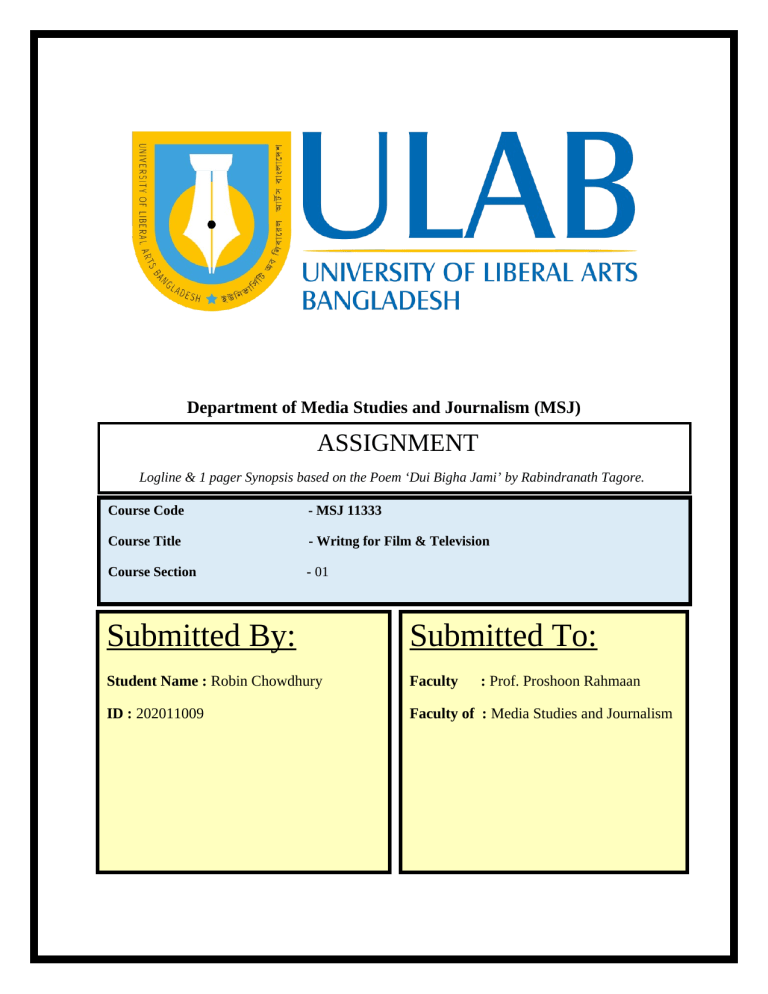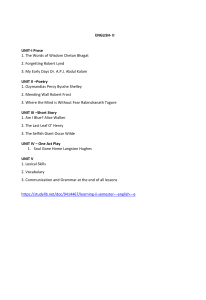
Department of Media Studies and Journalism (MSJ) ASSIGNMENT Logline & 1 pager Synopsis based on the Poem ‘Dui Bigha Jami’ by Rabindranath Tagore. Course Code - MSJ 11333 Course Title - Writng for Film & Television Course Section - 01 Submitted By: Submitted To: Student Name : Robin Chowdhury Faculty ID : 202011009 Faculty of : Media Studies and Journalism : Prof. Proshoon Rahmaan [ TITLE ]: Dui Bigha Jomi [ AUTHOR ]: Rabindranath Tagore (Poem) [ LOGLINE ]: A farmer fights for his ancestral land against a cruel zamindar, but after years away he returns to a transformed, hostile environment, battling for justice and redemption against impossible odds. [ SUMMARY ]: A poor peasant, Upen who had spent his entire life living on his half-acre of land in the remote village of Bengal. The land was his pride, his livelihood, and his family's legacy, passed down through seven generations. Unfortunately, his peace was shattered when a wealthy zamindar demanded Upen's land for his personal garden. Despite Upen's repeated pleas to spare his land, the zamindar was relentless and eventually obtained a court order to repossess it. Upen was devastated, forced to leave his home and become a wandering mendicant. For fifteen years, Upen traveled to different places across the country, seeking solace in the beauty of temples and landscapes, but he could never forget his lost homeland. When Upen returned to his village, he was heartbroken to see his land transformed into a showy garden with flowers and fountains. The zamindar's greed had destroyed his peaceful life and his family's legacy. However, Upen found solace in the presence of a mango tree, which he had loved since his childhood, and he sat under the tree and reminisced about his youth. While sitting under the tree, two ripe mangoes fell, and he saw it as a sign of his mother's return. Upen picked up the fruit as a keepsake but was caught by an Oriya gardener, who wrongly accused him of theft. The gardener took Upen to the zamindar, who verbally abused him and tried to humiliate him further. However, Upen's efforts to explain himself were futile as the zamindar did not listen. The poem ends with a smile on Upen's face, but it is a rueful smile that denotes his defeat. He realized that he can never win against the zamindar and his corrupt system, and he leaves the garden with a heavy heart. The story depicts the unfortunate reality of many individuals who are forced out of their homes or lands by others, and the corrupt systems that perpetuate these injustices. The tone of the screenplay is melancholic, depicting the sadness and despair of Upen, who has lost everything that he had held dear. The story carries a vital lesson of holding onto one's identity and legacy in the face of adversity. END OF COVER This assignment report is a resource which completely belongs to ULAB faculties and students.



